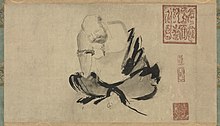Dazu Huike
| Dazu Huike | |
|---|---|

Huike Thinking by Chinese Song Dynasty painter Shi Ke (10th century)
|
|
| School | Chan |
| Personal | |
| Nationality | Chinese |
| Born | 487 |
| Died | 593 (aged 105–106) |
| Senior posting | |
| Title |
Chanshi 2nd Ch'an Patriarch |
| Predecessor | Bodhidharma |
| Successor | Jianzhi Sengcan |
Dazu Huike (487–593;Chinese: 大祖慧可; pinyin: Dàzǔ Huìkě; Wade–Giles: Ta-tsu Hui-k'o; Japanese pronunciation: Taiso Eka) is considered the Second Patriarch of Chinese Chán and the twenty-ninth since Gautama Buddha.
As with most of the early Chán patriarchs, very little firm data is available about his life. The earliest extant biography of the Chán patriarchs is the Biographies of Eminent Monks (519) (Chinese: 高僧傳; pinyin: Gāo Sēng Zhuàn) and its sequel, Further Biographies of Eminent Monks (Chinese: 隋高僧傳; pinyin: Suí Gāo Sēng Zhuàn; Japanese pronunciation: Zoku kosoden) (645) by Tao-hsuan (?-667). The following biography is the traditional Chan biography as handed down throughout the centuries, including the Denkoroku by Zen Master Keizan Jokin (1268–1325).
The Hsu kao-seng chuan says that Huike was born in Hu-lao (Sishui, modern Xingyang, Henan) and his secular name was Shénguāng (神光, Wade–Giles: Shen-kuang; Japanese: Shinko). A scholar in both Buddhist scriptures and classical Chinese texts, including Taoism, Huike was considered enlightened but criticised for not having a teacher. He met his teacher Bodhidharma at the Shaolin Monastery in 528 when he was about forty years old and studied with Bodhidharma for six years (some sources say four years, five years, or nine years).
Huike went to Yedu (Wade–Giles: Yeh-tu) (modern Henan) about 534 and, except for a period of political turmoil and Buddhist persecution in 574, lived in the area of Yedu and Wei (modern Hebei) for the rest of his life. It was during the time of upheaval that Huike sought refuge in the mountains near the Yangtze River and met Sengcan who was to become his successor and the Third Chinese Patriarch of Chan. In 579, Huike returned to Yedu and expounded the dharma, drawing large numbers to listen to his teachings and arousing the hostility of other Buddhist teachers, one of whom, Tao-heng, paid money to have Huike killed but Huike converted the would-be assassin. (ibid)
...
Wikipedia
